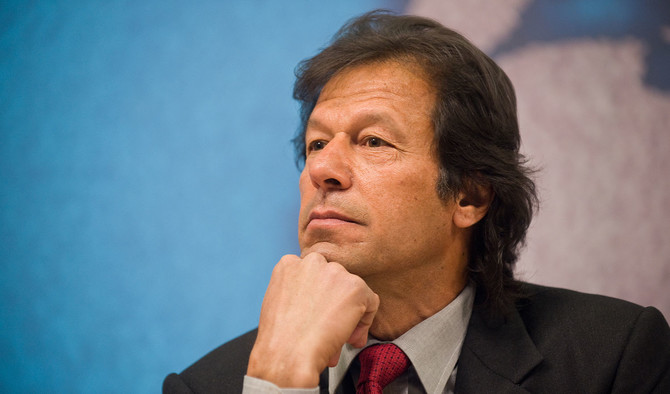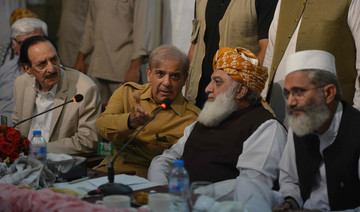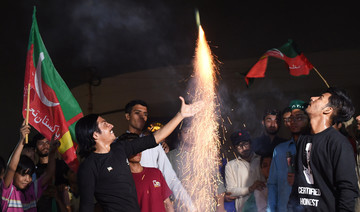KARACHI: As Pakistan is expected to use the International Monetary Fund’s loan facility to steer the country out of prevailing economic crisis, economists believe the country will have to bear the brunt of being on the Financial Action Task Force (FATF) gray list.
Imran Khan, the next prime minister of Pakistan in line, promises to work on human development in the country but his party faces tough economic challenges and is left only with the option to move to the IMF.
Pakistan was put on list of “Jurisdictions with strategic deficiencies,” known as the gray list, by the money laundering and terrorism-financing watchdog FATF. It was listed on June 29, 2018. The country has been on the list twice, in 2008 and 2012.
“Pakistan has been put on gray list of FATF, which means the IMF loan will be extended at higher interest rates and the burden will again be shifted on to the vulnerable and tax-paying class,” Dr. Ayub Mehar, research economist at Asian Development Bank Institute, told Arab News.
There is no question of the IMF denying loans to Pakistan by IMF because it is responsible for the fund to facilitate the member country, Mehar said. Pakistan can avail under special drawing rights up to $2.8 billion from the IMF.
The IMF program’s condition may include expenditure cuts as part of government austerity, which in turn will affect the economically vulnerable class in Pakistani society. “The IMF comes with its own assessment of the country but it largely depends on the extent to which the government can effectively negotiate terms with the fund,”, Dr. Asad Sayeed, research economist at the Institute of Development and Economic Alternatives, told Arab News.
As part of its expenditure cut, the government is likely to withdraw subsidies being given to the poor segment. “Whenever the expenditure cut is talked about, it is always viewed by which segment is going to bear the brunt. It will depend how the government is going to protect the interest of the poor, middle-class segments,” Dr. Sayeed noted.
The economists believe Khan’s government will have to confront a huge current account deficit, caused by trade and fiscal deficits, and the instability of the national currency which has been devalued for the fourth time since December 2017. “The IMF will call for further devaluation of the Pak rupee and expenditure cuts which means the country will have to compromise on the its development spending,” Muzzamil Aslam, senior economist and CEO of EFG-Hermes Pakistan, told Arab News.
The rising imports have increased the current account deficit of Pakistan to a historic high of $18 billion during the last fiscal year, which continues to exert pressure on the Pak rupee against other currencies following the huge demand/supply gap. Pakistan imported $60.9 billion worth of goods while its export stood at only $23.22 billion during the last fiscal year, FY18.
Mehar noted: “Other factors such as less inflow of foreign direct investment have also played a crucial role in the weakening of Pakistan’s foreign exchange reserves, which have gone down to $9 billion.”
As the external financing gap keeps rising — it is expected to be remain at $17 to $18 billion during the current fiscal year, FY19 — the country needs substantial external inflows to fulfil its international obligations. “Pakistan needs $10 to $15 billion for external debt servicing alone within the next 16 months,” Muzzamil Aslam said.
Economists say the PTI government will have to take tough economic decisions at home while negotiating for a new IMF bailout program. Tax net expansion, privatization or restructuring of loss-making public sector entities, ease of doing business, and supply of energy without interruption are areas that an incoming government will have to focus on.
Imran Khan’s development promises may face setback if economy keeps worsening, warn economists
Imran Khan’s development promises may face setback if economy keeps worsening, warn economists

- IMF may extend loans at higher rates, vulnerable segment to bear the brunt
- Pakistan needs $10-15 billion for debt servicing within next 16 months
Helicopter carrying Iran’s president suffers a ‘hard landing,’ state TV says without further details
Helicopter carrying Iran’s president suffers a ‘hard landing,’ state TV says without further details

- Ebrahim Raisi was traveling in Iran’s East Azerbaijan province
- State TV described the area of the incident as being near Jolfa
DUBAI: A helicopter carrying Iranian President Ebrahim Raisi suffered a “hard landing” on Sunday, Iranian state television reported, without immediately elaborating.
Raisi was traveling in Iran’s East Azerbaijan province. State TV described the area of the incident happening as being near Jolfa, a city on the border with with the nation of Azerbaijan, some 600 kilometers (375 miles) northwest of the Iranian capital, Tehran.
Raisi had been in Azerbaijan early Sunday to inaugurate a dam with Azerbaijan’s President Ilham Aliyev. The dam is the third one that the two nations built on the Aras River.
Iran flies a variety of helicopters in the country, but international sanctions make it difficult to obtain parts for them. Its military air fleet also largely dates back to before the 1979 Islamic Revolution.
Raisi, 63, is a hard-liner who formerly led the country’s judiciary. He is viewed as a protégé of Iran’s Supreme Leader Ayatollah Ali Khamenei and some analysts have suggested he could replace the 85-year-old leader after his death or resignation from the role.
Around 540 Pakistani students to return from Bishkek today via commercial flights— deputy PM

- First batch of 130 Pakistani students from Bishkek arrived in Lahore on Saturday night
- Fifty students have also registered to return home via special air force flight, says deputy PM
ISLAMABAD: Deputy Prime Minister (DPM) Ishaq Dar announced the government has arranged three commercial flights to repatriate around 540 Pakistani students from Bishkek today, Sunday, following violent clashes in the city this week that led to the evacuations.
The development took place after frenzied mobs attacked foreign nationals in the Kyrgyz capital of Bishkek on Friday. The attacks began after videos of a brawl between Kyrgyz and Egyptian students went viral on social media, prompting furious mobs to target hostels of medical universities and private lodgings of international students, including Pakistanis, in the city.
The first batch of around 130 Pakistani students arrived in Lahore late Saturday night. According to official statistics, around 10,000 Pakistani students are enrolled in various educational institutions in Kyrgyzstan, with nearly 6,000 residing and studying in Bishkek.
“Three commercial special flights have been arranged for today (Sunday) on which 540 students will come back while 130 returned yesterday,” Dar told reporters during a media briefing in Lahore.
“A special flight of Pakistan Air Force will also bring around 130 students. So far, 50 students have registered themselves to come on this flight,” he added.
Dar said he spoke with the foreign minister of Kyrgyzstan today, Sunday, who assured him that the situation in the country was under control and that no new incidents had occurred since Friday afternoon.
“Kyrgyz foreign minister has confirmed that 16 foreign students including four to five Pakistanis got injured during this incident and are under treatment,” Dar said.
He added that Kyrgyzstan’s government has also assured that security at students’ hostels has been enhanced and that they were constantly monitoring the situation.
Earlier on Saturday evening, the PM’s Office said Prime Minister Shehbaz Sharif had directed Dar and another cabinet member, Amir Muqam, to travel to Bishkek on Sunday and address the situation there.
Dar said they were not traveling to the country at the Kyrgyzstan government’s request, adding that Pakistan has instead sent two officers from the foreign office to facilitate the country’s embassy.
“We were supposed to leave today for the Kyrgyz republic but their foreign minister requested [us] not to come because it would give the wrong impression about the incident and would provide fuel to the opposition,” Dar said.
He said Kyrgyzstan’s foreign minister has categorically denied any Pakistani students were killed in the clashes.
“Their (Kyrgyzstan) foreign minister also said they have arrested a few culprits and assured that no one involved will be spared,” the deputy prime minister said.
Dar said Pakistan’s foreign office had summoned the Kyrgyz Charge d’Affaires to the Ministry of Foreign Affairs on Saturday for a demarche over the current situation.
“It [violence] happened due to a clash between students and foreign students were targeted from Pakistan, India, Bangladesh and Arab countries,” he said.
Dar said Pakistan’s embassy had confirmed the situation is not tense anymore and that Pakistanis injured are being provided the best possible medical facilities.
Separately, in a telephone call with Pakistan’s Ambassador to Kyrgyzstan Hasan Ali Zaigham, PM Sharif instructed the embassy to make the necessary arrangements for the special plane to bring back Pakistani students.
The prime minister said injured Pakistani students should be brought back to Pakistan on a priority basis.
“The Prime Minister also instructed to ensure repatriation of family members residing in Kyrgyzstan with the Pakistani students,” PMO said.
Pakistan says will push for peace in Middle East if elected non-permanent UNSC member

- Elections for five of 10 non-permanent seats of UNSC for 2025-26 to take place on June 6
- Pakistan has been elected as non-permanent UNSC member seven times, most recently in 2013
ISLAMABAD: Pakistan will work for peace in the Middle East and Africa, and promote the right of self-determination of people living under foreign occupation if it gets elected as a non-permanent member of the Security Council, Pakistan’s ambassador to the UN said on Sunday.
Elections for five of the 10 non-permanent seats on the UN Security Council for 2025-26 are set to take place on June 6. Pakistan says its candidacy has the endorsement of the 55-member Asian Group.
The South Asian country has been elected to the Security Council seven times, most recently in 2013. Other times Pakistan got elected was in 1952-1953, 1968-1969, 1976-1977, 1983-1984, 1993-1994 and 2003-2004.
Speaking to members of the US-based Pakistan Students Association Coalition (PSA Coalition) via video link, Pakistan’s Ambassador to the UN Munir Akram said election to the Security Council would require Islamabad to play a leading role in addressing Kashmir, Afghanistan and counterterrorism issues.
“Pakistan will articulate developing countries’ aspirations, work for peace and in the Middle East and Africa as well as promote the right of self-determination for peoples under foreign occupation if elected as a non-permanent member of the UN Security Council,” Akram said, according to the state-run Associated Press of Pakistan (APP).
Akram spoke about the current state of the world. including key global challenges amid regional conflicts.
“He said that as the intense competition between major powers became a new reality of the world order, the world was undergoing a fast transition from its unipolar status to a bipolar plus order,” the APP said.
The Pakistani ambassador’s comments came as Israel continues its relentless military assault on Gaza. Israel’s attacks against Hamas have killed at least 35,386 people, mostly civilians, according to the Hamas-run Gaza health ministry.
The Jewish state’s siege has brought dire food shortages and the threat of famine to the densely populated territory.
Pakistan, which does not have diplomatic ties with Israel, has consistently called for an immediate ceasefire in the Middle East and urged world powers to work toward a two-state solution in the restive region, according to the aspirations of the people of Palestine.
Vote count underway after polling ends for NA-148 by-election in Pakistan’s Multan

- Yousaf Raza Gillani vacated the NA-148 seat after getting elected Senate chairman
- Tough competition expected between SIC’s Taimur Malik and PPP’s Ali Musa Gillani
ISLAMABAD: The counting of votes was underway after polling ended for a by-election in National Assembly constituency, NA-148, in Pakistan’s Multan on Sunday, state-run media reported.
Former prime minister Yousaf Raza Gillani won the NA-148 seat in Multan in the contentious Feb. 8 national election. However, Gillani vacated the seat after he was elected to the post of Senate chairman in April.
Polling for Sunday’s by-election began at 8am and continued uninterrupted till 5pm. The constituency has a total of 444,231 registered voters, and 275 polling stations and 933 polling booths were set up for the exercise.
“Counting of votes is underway after polling for bye-election in NA-148 Multan-1 concluded at 5:00 pm,” the state-run Radio Pakistan broadcaster reported.
Eight candidates including the ex-PM Imran Khan-backed Sunni Ittehad Council (SIC) leader Taimur Malik and Pakistan Peoples Party’s (PPP) Ali Qasim Gillani, were vying for the seat.
Authorities made comprehensive security arrangements free, fair and transparent conduct of polls in the constituency.
Pakistan’s national election on Feb. 8 was marred by a countrywide shutdown of mobile phone services. The results of the polls, which were declared unfair by Khan and his party, threw up a hung parliament in which no political party emerged with the majority to form its government.
Khan’s Pakistan Tehreek-e-Insaf (PTI) party, which formed the largest bloc in the National Assembly after winning over 90 seats, said it won a two-thirds majority but was denied victory by Pakistan’s election regulator, accusing it of manipulating votes.
The Election Commission of Pakistan (ECP) denied the allegations and so did the caretaker government.
Pakistan’s religion minister arrives in Makkah to review Hajj 2024 arrangements

- Chaudhry Salik Hussain to visit Saudi institutions, catering companies and residences of Hajj pilgrims today, says religion ministry
- At least 22,696 Pakistani pilgrims arrived in Madinah via 93 flights since April 9 when Pakistan started pre-Hajj flight operations
ISLAMABAD: Religious Affairs Minister Chaudhry Salik Hussain reached Makkah on Sunday to review Hajj 2024 arrangements, the religion ministry said, as Pakistani pilgrims continue to arrive in Saudi Arabia ahead of the annual Islamic pilgrimage.
Hajj is one of the five pillars of Islam and requires every adult Muslim to undertake the journey to the holy Islamic sites in Makkah at least once in their lifetime if they are financially and physically able.
Pakistani pilgrims have been arriving in Madinah since May 9 when Pakistan launched its pre-Hajj flight operations. At least 22,696 Pakistani pilgrims have since arrived in Madinah through 93 flights, the Ministry of Religious Affairs (MoRA) said in a statement.
Hussain, who arrived in Madinah earlier this week to inspect Hajj arrangements, reached Makkah on Sunday to hold important meetings with Saudi officials and gauge preparations for the Islamic pilgrimage.
“Chaudhry Salik Hussain will visit Saudi institutions, catering companies, and residences of Hajj pilgrims today, Sunday,” MoRA said in a statement.
It added the minister would visit the Pakistan Hajj Mission in Makkah’s office after performing Umrah.
Pakistan’s religion ministry said over 11,000 Pakistani Hajj pilgrims visited the “Riazul Jannah” in Madinah, a small space between the pulpit and the grave of Prophet Muhammad (peace be upon him).
Pakistan has a Hajj quota of 179,210 pilgrims this year, of which 63,805 people will perform the pilgrimage under the government scheme, while the rest will use private tour operators. This year’s pilgrimage is expected to run from June 14-19.













